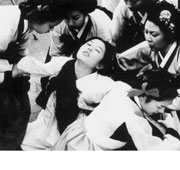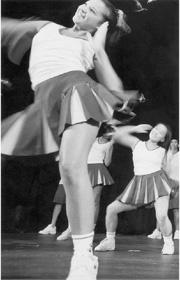SET IN FEUDAL KOREA, Im Kwon Taek’s Chunhyang is filled to the brim with fairy tale-like qualities. Golden light washes over lush rice paddies, stately palaces, and the porcelain faces of young, long-haired women, whose ridiculous names—”Miss Spring Moon,” “Miss Pine Fidelity,” “Miss Traveling Scent”—give them all the dignity of Tinkerbell. Appropriate to this milieu, the film is the most faithful telling of an old-fashioned doomed love story in a long time: A poor but beautiful girl (Lee Hyo Jung) captures the heart of a nobleman’s son (Cho Seung Woo). They marry in secret. He goes away for several years. She’s sent to jail. He returns to save her. There’s no modern revisionism in this traditional 18th-century tale, no pop feminist rants as in 1998’s Cinderella update Ever After, no wink-wink pokes at ber-hero Odysseus as in the recent O Brother, Where Art Thou.
CHUNHYANG
directed by Im Kwon Taek with Lee Hyo Jung, Cho Seung Woo, and Cho Sang Hyun runs February 2-8 at Egyptian
Like that Coen Brothers musical, the most impressive aspect of Chunhyang is the energetic singing that accompanies its overdetermined melodrama. Pansori, a sort of free-form Korean opera, is sung a cappella with the occasional thud of a drum punctuating the lyrics. Virtuoso Cho Sang Hyun belts out the narrative in yips, yells, and squeals, relating the story to us in intermittent scenes. With unpredictable rhythm, Cho infuses a restless dynamic to this otherwise restrained picture. His singing on a spare contemporary stage makes for a refreshing contrast to the glossy frames of the period piece enacted by primly costumed actors.
If director Im, who has made nearly 100 movies in his long career, is trying to revive pansori for the MTV generation (with Cho as his Nusrat Fateh Ali Khan), he should have departed a bit from the atavistic plot, which maddeningly insists on the heroism of a man who is a gallant lover but a coward in the face of paternal law. As a storybook set in motion, Chunhyang‘s characters seem plucked from a woodblock print: Our star-crossed lovers are immaculate in beautiful silk robes, mouthing poetic verse—”The wild geese desire the sea, the crabs their holes, the butterfly the flower.” Meanwhile, the nobleman’s servant (Kim Hak Yong) plays up the figure of the fool with exaggerated physical gestures, in one scene skipping over a brook like a bird. It’s hard to feel any sympathy for such cartoonlike figures. The film, while often visually striking, feels too much like a museum display sponsored by the Korean Consulate.







